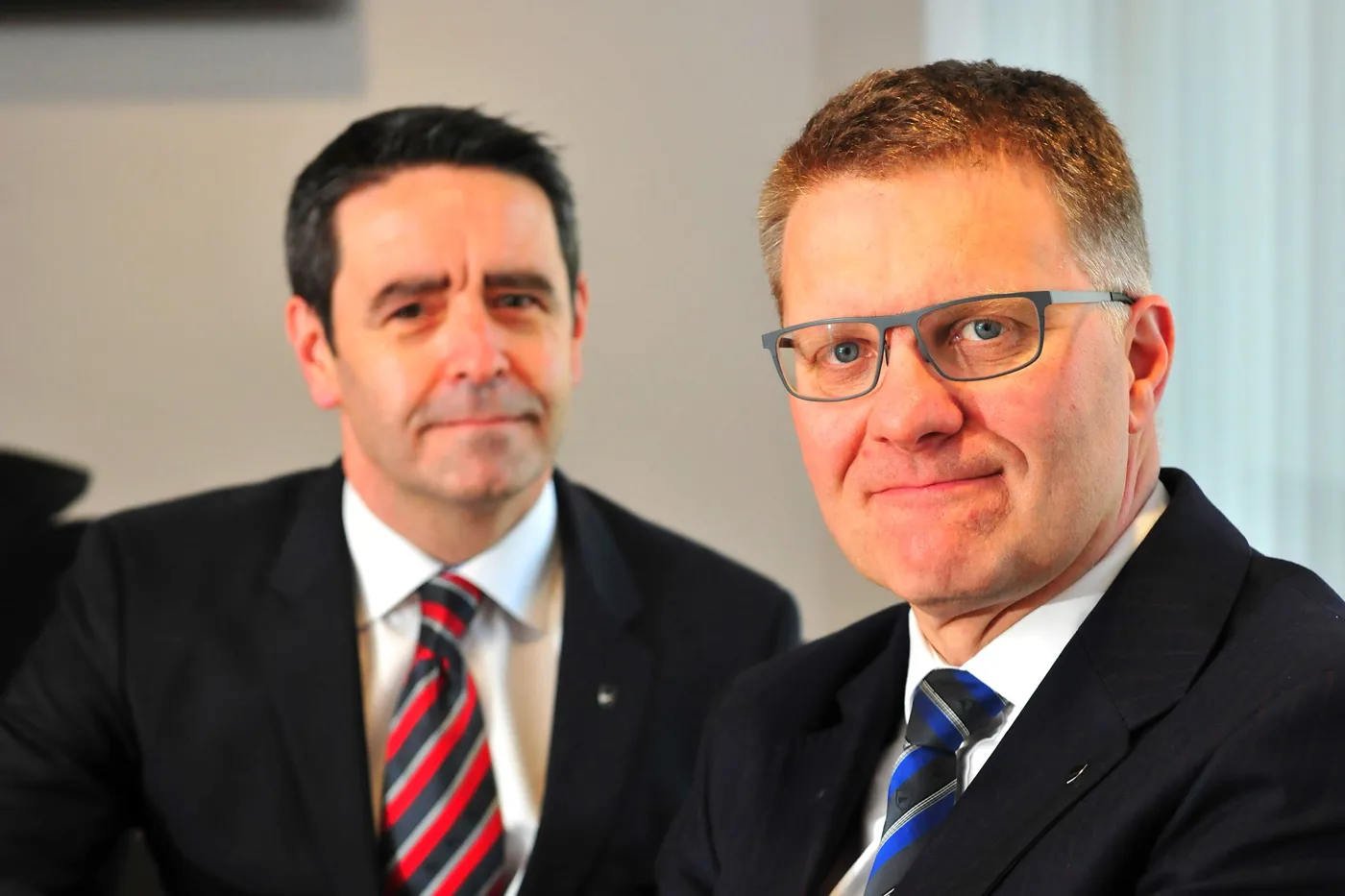"We love data, to the distraction of everyone else, I suspect, and therefore we can measure and monitor so many different areas.”
So says Vertu Motors chief executive Robert Forrester, who is sitting with me and commercial director David Crane in Forrester’s office in Vertu House, Gateshead, demonstrating on a large wall-mounted screen the depths of information into which they can delve at each of the motor retail group’s 121 dealerships.
One moment we are looking at the whole group’s used and new car sales month-to-date versus plan, what cars are in stock in various price brackets, their stand-in values, how many are ageing past 90 days, and what fresh stock is due in.
The next moment we are a few clicks further in and looking at a league table of salespeople in one of Vertu’s divisions. Clicking through to an individual salesman in one of its Vauxhall dealerships, we can see the data on every individual sale the salesperson made this month, from the margin in the metal, to the profit in the finance and whether he sold any add-ons or a service plan. It will also identify who the customer was and their satisfaction score.
As we watch, another used car sale is added automatically to the group’s tally.
We click through to see the car had been in stock at the Ford dealership for less than 30 days, yet has been sold at only £720 margin. This prompts questions from Crane. We delve further and it seems the sales executive is behind the pace on sales and his margins are underperforming too. Crane knows there’ll be a reason behind it, but Vertu’s ability to identify a trend and help its general managers to address it is impressive.
The same applies to aftersales, enquiries, staff turnover, data quality (including gathering of email addresses) and complaints. Data is constantly fed to Vertu House from the dealerships via a system called Showroom, which Vertu’s own team of software developers created in-house. They also built and maintain its websites, and have created its own service plan system.
It’s a demonstration of the capabilities of a top 10 AM100 motor retailer.
“We think of that as something of a competitive advantage, because if we want to change something we just write it and get it changed. Also, if we do come up with a wacky wheeze that we think gives us an advantage, there isn’t a product supplier out there who then gets to sell that same advantage to everyone. Which is certainly what we had historically,” said Forrester.
Measuring it and managing it
All this data is only useful if it is acted upon. But Vertu is hot on individual accountability and giving a clear understanding to every employee of what is required and the process the company uses to achieve it. Its measurements ensure that managers are aware whether the steps of that process are being followed or not.
One example is used car service plans – each morning, a dealership’s sales executives are assessed on whether they provided a quote on a service plan with each car delivery the previous day, whether they presented the plan, and whether their manager came out to help sell it.
Crane said: “The trick is drilling down into the individual responsibility of ‘did you do your job well enough yesterday or not’? And if you didn’t, what are you going to do today that’s different?” Ultimately, the checks and controls benefit every individual in the dealership, helping them to drive a process and reap the rewards. Vertu’s goal is consistent execution, because the customer will expect nothing less.
“If it had been easy to solve sales executive turnover in this industry somebody would have done it,” Forrester said.
Forrester and his senior management team have been brainstorming for a strategy to tackle people issues. Half of Vertu’s employees have been in the group or the businesses it has acquired for more than five years, and a quarter for more than 10 years, but there is the remaining quarter, who “stay five minutes”, as Forrester puts it.
“Our number one challenge is in the area of recruitment, induction and retention, particularly of sales executives, and we’re going to have to be quite radical,” said Forrester. He said Vertu will not accept that it is an industry challenge, adding that that is just an excuse.
“The size and scale of dealerships isn’t in my control, and the impact of the internet, well, we’ll just have to respond to it. But the people bit, we should be able to impact that and it’s actually the biggest differentiator.”
“We measure and monitor so much in our business, and when we deep dive into what’s causing the problems, almost every discussion concludes that actually, in that particular dealership, we just haven’t got very good people, or managers, or a very good leader. Then as soon as you get that bit in place, you’ve more confidence in everything else that’s going to happen in that dealership.”
Forrester wouldn’t reveal his strategies because he wants to keep a competitive advantage. However, areas he has highlighted include apprenticeships, sales executives’ low basic pay, sales structures, the hours some staff are working and the imbalance in the split between male and female sales executives.
Currently, only 12% of Vertu’s sales staff are female and it would like this to increase to better reflect the customer base, where 85% of car sales are influenced by a female customer. The dealer group is considering part-time working and flexible employment as part of its solution.
“Our number one challenge is in recruitment, induction and retention, particularly of sales executives, and we’re going to have to be quite radical” Robert Forrester, chief executive, Vertu Motors
Members of its centralised digital team, who provide live chat cover until 10pm, already work from home. Crane said the long-term solution may include some sales executives on a flexible package, with tablet PCs providing access to the showroom systems and enquiry management systems.
However, Vertu sees technology playing a minor role in the debate, which is actually about industry structures. Forrester also suggested there will be a number of different answers to the problem, each suiting different companies. Although large groups have the advantage of a HR team to develop their strategies, they are inherently inflexible, while single dealerships may have an owner happy to allow informal arrangements and complete flexibility.
Ultimately, it will come down to the leaders of motor retail businesses. “Our job is to change things. The cost to the industry, or our company more importantly, of customers walking in and seeing a new sales team is not a good thing. Where we have dealerships with very stable sales colleagues, we have high levels of customer satisfaction and loyalty, and great levels of profitability.”
Vertu’s sales executives earn an average of £32,000, which has increased from £28,000 in four years. Two of its divisions have already seen their basic pay increase, with sales executives on £18,000+OTE and business managers on £23,000+OTE, and the group will monitor that over time to understand the results. Asked whether motor retail needs to be a seven-day a week business, Forrester said it’s a fascinating subject which has been well discussed by his management team.
In Scotland, Vertu’s dealerships, which trade as Macklin Motors, are closed on a Sunday. Some of its smaller showrooms in England, such as Carlisle Seat, also close on Sundays.
“Our assessment of that, having done it for a while, is that it does not impact sales, which begs the question why not do it? However, we have big pieces of kit costing multi-million pounds, and we are a consumer retail company. I’m not convinced that Marks & Spencer shareholders would be particularly keen if it announced all its stores were shutting on Sunday.
“For the broad brush of our dealerships, in a multi-cultural society where Sunday isn’t the Sabbath for everybody, it makes not a lot of sense. For the average consumer, the days when they’re most available to come and buy a car are Saturday and Sunday.
“Actually what we’re trying to do by closing on a Sunday is overcome other issues, which are about working structures and margins. It’s a low-margin business and therefore you don’t have the luxury of enough bandwidth of colleagues to cover all of the hours that we need to trade.”
Improving the recruitment process to slow staff turnover
Vertu Motors was one of the first UK motor retailers to launch a jobs and careers website. Once candidates are selected, its recruitment process involves a first interview, psychometric testing and a second competency-based interview process.
However, it is another area that cannot be allowed to stand still. Crane has been going through every job offer letter proposed across the group, requesting the interview forms – in a couple of instances there wasn’t one, which identified an issue to tackle – and using those forms to monitor the quality of the interview.
This has stemmed from the suspicion that one underlying reason for sales executive turnover could be that the group’s recruitment needs to improve. Forrester would like to have a measure for all Vertu’s directors and managers of how good a recruiter they are, of whether their recruits perform or leave.
Such measurements will be used to identify training needs. Ultimately, if a manager is talented at what they do, but simply not strong at recruiting, the group will get someone else to do the recruiting for them.
The senior team at Vertu take their role as business leaders very seriously. As advocates of management gurus such as Dave Anderson and Don Reid, whom they bring over from America to train their line managers, and fervent readers of business guides and leadership, they see their role as ‘servant-leaders’ who must motivate and take decisions that support Vertu employees’ ability to do their own jobs better.
Forrester acknowledges that these views are not revolutionary: “We largely don’t come up with industry-leading strategic initiatives. What we are focused on is execution. Our strategies are actually pretty simple, so people can understand them, then we work really hard on making sure the strategy isn’t just a set of words that people love spouting out, but is an actual reflection of what happens on a day-to-day basis.”
Crane said the board will study what others are doing in the UK and USA and will “pinch ideas from anybody”.
Being a plc isn’t an excuse for being a faceless organisation. “With the information systems, everybody can see anything, so it’s a very open culture, with a lot of recognition. I don’t actually think we are remote,” said Forrester.
“The trick is drilling down into the individual responsibility of ‘did you do your job well enough yesterday or not’? And if you didn’t, what are you going to do today that’s different?” David Crane, commercial director, Vertu Motors
He is active on Twitter and also writes a blog to the entire company every few days to keep them aware of what he’s doing and thinking, even what his family has been up to. Every Saturday, Forrester emails the workforce to highlight the group’s sales performance and celebrate employees’ good achievements, even those outside of work. Crane emails service and parts managers every morning with business progress reports.
Internal competitions and its annual ‘Masters Club’ awards programme see 33 non-management employees rewarded with a weekend away, partying with their partners alongside the senior management and their own families. There is always the pressure of targets and regulation, but there also needs to be fun in the workplace.
“It’s all about sending the message that the people who run the business have good character and we are all on one mission. We all have our ups and downs, but I think it’s
important that everybody in the organisation understands where we are, what we think,” Forrester said.
Crane, who does much of Vertu’s acquisition work, has found some staff transferred from smaller businesses taken over may feel nervous about being in a plc initially.
“What they mean is they want to be treated with respect, and the reality is they don’t work for Robert or anyone here at Vertu House, they work for a general manager of a dealership and our part is ensuring we’ve got the right person in that GM role. Because we empower the GM on his people. They’re his people, he communicates with them, recruits them, he ensures our values are in place and is largely responsible for training them every day in the workplace,” he added.
Forrester said: “We are really lucky to have the talented group of general managers we have.”
It is the GMs who can give the senior team feedback from the front line, and who act as a sounding board for “some of the mad ideas” Crane says the senior management team may come up with.
“The classic challenge as the group gets bigger and bigger is, one, how do you maintain consistency, values and a feeling of belonging across an ever-expanding row of people, and two, what level of control do you keep, compared with devolved decision-making.
“The best answer to that is always devolved decision-making, which is why our general managers are so appreciated.”















A.WEbb - 02/08/2017 12:17
If only Vertu paid as much attention to sending spam emails. I bought a car from them 4 years ago and have been bombarded ever since. No matter how many times I unsubscribe, I still get them. So I have set the ICO on them, for DPA breach. Enjoy the fine chaps.